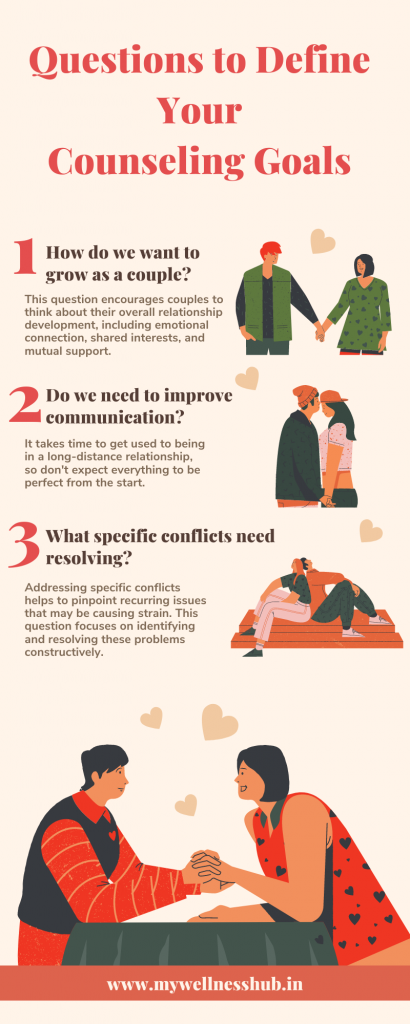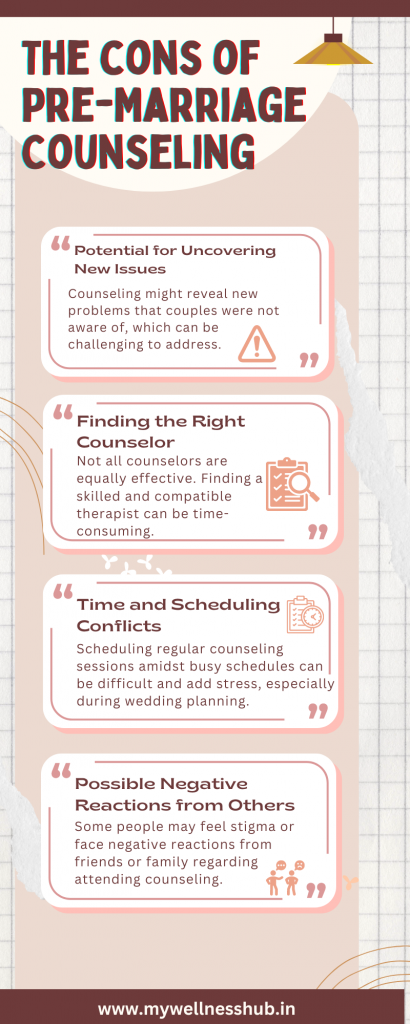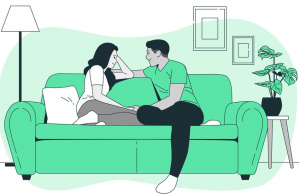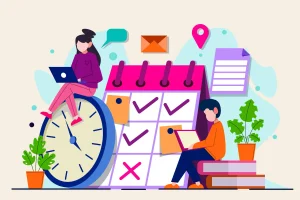Pros and Cons of Pre-Marriage Counseling: What to Expect
By Wellness Hub
Last Updated: July 1, 2024
Embarking on the journey of marriage is like setting sail on a grand adventure—it’s thrilling, filled with anticipation, and, admittedly, a bit daunting. That’s where the hidden treasure of pre-marriage counseling comes in. More than just a formality, it’s a strategic step towards building a durable marital foundation. Think of pre-marriage counseling not just as preparation, but as essential groundwork for your shared future. It opens up a dialogue on crucial, often overlooked topics—financial planning, communication dynamics, life aspirations—guided by a professional. It’s the kind of upfront investment in your relationship that pays dividends long after the ‘I do’s.
Book Your Marriage Counseling Now
What is Pre-Marriage Counseling?
Pre-marriage counseling is a type of therapy designed to help couples prepare for marriage. Its primary purpose is to provide a strong foundation for a healthy, long-lasting relationship by addressing potential issues before they become major problems. By engaging in pre-marriage counseling, couples can gain valuable insights into each other’s expectations, communication styles, and future goals.
Typically, pre-marriage counseling involves sessions with a licensed therapist. These sessions are structured to cover various aspects of a relationship, including:
- Communication Skills: Effective communication is the cornerstone of any successful relationship. Counseling sessions help couples develop better ways to express their thoughts and feelings openly and honestly.
- Conflict Resolution: Every couple will face disagreements. Pre-marriage counseling teaches techniques for resolving conflicts in a healthy and constructive manner.
- Financial Planning: Money is a common source of stress in relationships. Counseling helps couples discuss their financial expectations and create a plan for managing their finances together.
- Family and Parenting: For couples planning to have children, discussing parenting styles and family values can prevent future disagreements.
- Personal Values and Beliefs: Understanding each other’s core values and beliefs is crucial for a harmonious relationship. Counseling provides a space to explore these topics in depth.
- Intimacy and Sexuality: Addressing expectations and concerns about intimacy can strengthen the bond between partners.
The Pros of Pre-Marriage Counseling

1. Identifying and Addressing Potential Issues
Pre-marriage counseling is a proactive approach to ensure a strong foundation for your marriage. One of the key benefits is its ability to help couples identify potential issues early on. During counseling sessions, you and your partner will discuss common areas of conflict such as money management, communication styles, and expectations. By addressing these issues before they escalate, you can prevent them from becoming major problems in the future. This early intervention allows couples to navigate tricky topics with the guidance of a professional, leading to a more harmonious relationship.
2. Improving Communication Skills
Effective communication is crucial for any successful relationship. Pre-marriage counseling emphasizes the importance of open and honest dialogue between partners. Many couples struggle with communication, whether it’s expressing feelings, listening actively, or resolving conflicts. Counseling provides the tools and techniques needed to improve these skills. For instance, you might learn how to use “I” statements to express your feelings without blaming your partner or practice active listening to ensure both parties feel heard and understood. Improved communication can lead to fewer misunderstandings and a stronger, more connected relationship.
3. Strengthening the Relationship
Working through issues together in a structured environment can significantly strengthen your bond. Pre-marriage counseling offers a safe space to discuss difficult topics and explore each other’s perspectives. This process fosters mutual understanding and respect, which are essential for a healthy relationship. When couples face challenges together and find solutions collaboratively, it builds trust and reinforces their commitment to each other. The skills learned in counseling can be applied throughout your marriage, helping you navigate future obstacles with confidence.
4. Gaining a Neutral Perspective
One of the unique advantages of pre-marriage counseling is the opportunity to receive an unbiased opinion from a professional. A licensed therapist can provide an objective view of your relationship, helping you see things from a different perspective. This can be especially valuable when you and your partner have differing viewpoints. The therapist can offer insights that you might not have considered and suggest strategies to bridge any gaps. This neutral perspective can be a game-changer, allowing you to address issues more effectively and strengthen your partnership.
5. Preparing for the Future
Pre-marriage counseling is not just about addressing current issues; it’s also about preparing for the future. Couples often discuss long-term goals and potential challenges during sessions, such as financial planning, child-rearing, and career aspirations. By having these conversations early, you can align your expectations and create a shared vision for your future together. This proactive approach ensures that you and your partner are on the same page, reducing the likelihood of conflicts down the road. Planning for the future also includes discussing how to handle changes and stressors, ensuring you have a solid plan for maintaining a healthy relationship over time.
The Cons of Pre-Marriage Counseling

1. Potential for Uncovering New Issues
While pre-marriage counseling can be highly beneficial, it can also bring up problems that couples were not previously aware of. This can be both a challenge and an opportunity for growth. On one hand, discovering new issues can be unsettling and may lead to difficult conversations. However, addressing these problems before marriage can prevent them from escalating in the future. It’s an opportunity to work through challenges with the guidance of a professional, ultimately leading to a stronger and more resilient relationship.
2. Finding the Right Counselor
Finding a skilled and compatible therapist is crucial for effective pre-marriage counseling. Not all counselors are equally effective, and a poor match can hinder the progress of your sessions. It’s important to take the time to research and choose a therapist who is experienced in couples counseling and aligns with your needs and values. Reading reviews, seeking recommendations, and having an initial consultation can help you find the right fit. Remember, the goal is to work with someone who can provide valuable insights and foster a supportive environment for growth.
3. Time and Scheduling Conflicts
One of the practical challenges of pre-marriage counseling is finding the time for sessions amidst busy schedules. Wedding planning itself can be time-consuming and stressful, and adding counseling sessions to the mix can sometimes feel overwhelming. This added stress can lead to conflicts, especially if one or both partners struggle to make time for the sessions. It’s important to approach this proactively, perhaps by scheduling sessions well in advance and treating them as a priority. Remember, the time invested in pre-marriage counseling can pay off significantly in the long run.
4. Possible Negative Reactions from Others
Attending counseling still carries a stigma in some cultures and communities. Some people might feel embarrassed or worry about what others will think if they attend pre-marriage counseling. Cultural or familial opinions can impact the decision to seek counseling, and couples might face negative comments or judgment from loved ones. It’s important to remember that the decision to attend counseling should be based on what’s best for your relationship. Focusing on the benefits and the future of your marriage can help you navigate any negative reactions with confidence.
What to Expect in Pre-Marriage Counseling Sessions
Structure of Counseling Sessions
Pre-marriage counseling sessions typically follow a structured format to ensure that all important topics are covered. These sessions are usually scheduled weekly or bi-weekly and last about 60 to 90 minutes. The number of sessions can vary depending on the couple’s needs and the specific issues they want to address. During each session, the therapist guides the discussion, helping the couple navigate through various aspects of their relationship.
Common Topics Covered
- Communication
- Effective communication is essential for a healthy marriage. Counseling sessions focus on teaching couples how to express their thoughts and feelings clearly and listen actively to each other. This includes learning how to resolve conflicts without escalating tensions.
- Finances
- Money is often a major source of stress in relationships. Counseling helps couples discuss their financial expectations, budgeting strategies, and long-term financial goals. This ensures both partners are on the same page regarding their financial future.
- Expectations
- It’s important for couples to align their expectations about marriage. Topics like household responsibilities, career ambitions, and lifestyle choices are discussed to prevent future misunderstandings.
- Family and Parenting
- For couples planning to have children, discussing parenting styles, family traditions, and values is crucial. Counseling provides a platform to talk about these topics in depth, ensuring both partners share a common vision for their future family.
- Intimacy and Sexuality
- Addressing expectations and concerns about intimacy can strengthen the emotional and physical bond between partners. Counseling sessions provide a safe space to discuss these sensitive topics openly.
Role of the Therapist
The therapist plays a crucial role in pre-marriage counseling. They act as a neutral facilitator, guiding discussions and providing insights that help couples understand each other better. Therapists are trained to identify potential issues and offer strategies to address them effectively. They create a supportive environment where couples can openly discuss their concerns and work towards solutions.
Making the Decision
Deciding whether pre-marriage counseling is right for you and your partner is a personal choice that should be made together. Here are some tips to help you determine if pre-marriage counseling is a good fit for your relationship:
1. Assess Your Relationship’s Unique Needs
Every relationship is different, and what works for one couple may not work for another. Consider the specific needs and dynamics of your relationship. Are there areas where you and your partner struggle to communicate? Do you have different views on important topics like finances, family, or career goals? Pre-marriage counseling can provide a structured environment to address these issues before they become major problems.
2. Evaluate Your Goals and Expectations
Think about your goals and expectations for your marriage. Pre-marriage counseling can help align your visions for the future and ensure that you are both on the same page. Discussing your hopes and dreams with a therapist can clarify any misunderstandings and set a solid foundation for your marriage.
3. Make the Decision Together
The decision to attend pre-marriage counseling should be a mutual one. Both partners need to be committed to the process for it to be effective. Have an open and honest conversation about the potential benefits and drawbacks of counseling. Discuss how it might help strengthen your relationship and prepare you for the challenges ahead.
4. Consider Timing and Commitment
Consider your current schedule and the time commitment required for counseling sessions. Pre-marriage counseling typically involves multiple sessions, so it’s important to ensure that you can both attend regularly without adding undue stress to your lives. Plan ahead and treat these sessions as a priority.
5. Seek Professional Guidance
If you’re unsure whether pre-marriage counseling is right for you, consider seeking advice from a professional. A licensed therapist can help assess your relationship’s needs and determine if counseling would be beneficial. They can also provide insights into what to expect from the process and how it can help your relationship.
Conclusion
Engaging in pre-marriage counseling is a proactive step toward nurturing a resilient and fulfilling relationship. While challenges may arise, like discovering unexpected issues or selecting the ideal counselor, the profound benefits, such as enhanced communication and alignment on key life goals, significantly tip the scales in favor. Embrace this journey with openness and a mutual commitment to grow, tailored to your unique relationship dynamics. At Wellness Hub, our skilled therapists are dedicated to guiding you both to a sturdy, harmonious future. Let us help you lay a robust foundation for your marriage.
1. What is pre-marriage counseling?
Pre-marriage counseling is a type of therapy designed to help couples prepare for marriage. It involves sessions with a licensed therapist to discuss various aspects of the relationship, such as communication, finances, and expectations, to ensure a strong foundation for a successful marriage.
2. Why is pre-marriage counseling important?
Pre-marriage counseling is important because it helps couples identify and address potential issues early, improve communication skills, and align their future goals. This proactive approach can prevent future conflicts and strengthen the relationship.
3. What topics are covered in pre-marriage counseling?
Common topics covered in pre-marriage counseling include communication, finances, expectations, family and parenting, and intimacy. These sessions provide a safe space to discuss important aspects of the relationship and plan for the future.
4. How can pre-marriage counseling improve communication skills?
Pre-marriage counseling teaches couples effective communication techniques, such as using “I” statements and active listening. These skills help partners express their thoughts and feelings clearly and resolve conflicts constructively.
5. What are the benefits of pre-marriage counseling?
The benefits of pre-marriage counseling include identifying and addressing potential issues early, improving communication skills, strengthening the relationship, gaining a neutral perspective, and preparing for future challenges.
6. What are the potential drawbacks of pre-marriage counseling?
Potential drawbacks of pre-marriage counseling include uncovering new issues that may be challenging to address, finding the right counselor, time and scheduling conflicts, and possible negative reactions from others.
7. How do we decide if pre-marriage counseling is right for us?
Deciding if pre-marriage counseling is right for you involves assessing your relationship’s unique needs, evaluating your goals and expectations, and having an open and honest discussion with your partner. It’s important to make the decision together and consider seeking professional guidance.
8. How many sessions are typically needed for pre-marriage counseling?
The number of sessions needed for pre-marriage counseling can vary depending on the couple’s needs. Typically, sessions are scheduled weekly or bi-weekly and last about 60 to 90 minutes.
9. What should we expect during a pre-marriage counseling session?
During a pre-marriage counseling session, you can expect to discuss various aspects of your relationship with the guidance of a licensed therapist. The therapist will help you navigate important topics, improve communication, and plan for the future.
About the Author:
Prapoorna Mangalampalli
M.Sc., M.A., (Dual Masters in Psychology & English) – Counselor (6+ years of experience)
Prapoorna is a skilled counselor with dual Master’s degrees in Psychology and English. With more than six years of professional experience, she specializes in providing various types of counseling, including online Therapy , Marital , Relationship, child, family, and career counseling. Prapoorna is part of the Wellness Hub team, where she contributes significantly to their mission. She values a team-based approach and is committed to innovation, compassion, and the success of her clients. Her diverse educational background and extensive experience enable her to offer insightful and effective counseling services that positively impact individuals and families.
Book your Free Consultation Today
Parent/Caregiver Info:
Client’s Details:
* Error Message









